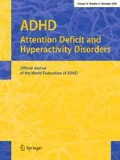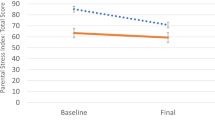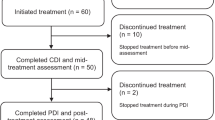Abstract
The aim of the study is to investigate metaparenting (effortful, deliberate cognition about parenting) in parents of children at risk for ADHD including predictors, correlates, and intervention outcomes. Parents (n = 68) of children with significant ADHD symptoms (i.e., ≥6 inattentive or hyperactive/impulsive symptoms with impairment in ≥2 settings, mostly un-medicated) provided ratings of metaparenting, parenting stress and practices, and child ADHD symptoms before and after parent training. Parents were predominantly Caucasian, in their upper thirties, and most had schooling beyond high school. We investigated the relation between metaparenting and baseline predictors, and whether metaparenting predicted (1) parenting behaviors at baseline, (2) attrition, and (3) parenting stress and parent/child behaviors at outcome. More educated mothers, with fewer people living in the home, and higher levels of parenting stress, reported more metaparenting. Parents with lower problem-solving and assessing scores reported more inconsistent parenting, and those with lower problem-solving scores were more likely to drop out of parent training. Higher problem-solving and reflecting scores at baseline were associated with more parental stress. Higher reflecting at baseline predicted child hyperactivity/impulsivity at outcome. Our findings indicate metaparenting is associated with parenting behaviors and decisions to complete parent training. Furthermore, metaparenting appears to be a complex, finely nuanced construct with both positive and negative associations with reports of parenting practices and stress.
Similar content being viewed by others
References
Abidin RR (1995) Parenting stress index—short form. Psychological Assessment Resources, Inc., Lutz
Bornstein MH (ed) (2002) Handbook of parenting, 2nd edn. Lawrence Erlbaum Associates, Mahway
Chronis AM, Jones HA, Raggi VL (2006) Evidence-based psychosocial treatments for children and adolescents with attention-deficit/hyperactivity disorder. Clin Psychol Rev 26(4):486–502
Clerkin SM, Marks DJ, Policaro KL, Halperin JM (2007) Psychometric properties of the Alabama parenting questionnaire-preschool revision. J Clin Child Adolesc Psychol 36(1):19–28
Corkum P, Rimer P, Schachar R (1999) Parental knowledge of attention-deficit hyperactivity disorder and opinions of treatment options: impact on enrolment and adherence to a 12-month treatment trial. Can J Psychiatry 44:1043–1048
Cunningham CE, Bremner R, Boyle M (1995) Large group community-based parenting programs for families of preschoolers at risk for disruptive behavior disorders: utilization, cost effectiveness, and outcome. J Child Psychol Psychiatry 36(7):1141–1159
Cunningham CE, Bremner R, Secord M (1998) COPE the community parent education program: a school based family systems oriented workshop for parents of children with disruptive behavior disorders. COPE Works, Hamilton
Evans SW, Schultz BK, Sadler JM (2008) Psychosocial interventions used to treat children with ADHD: safety and efficacy. J Psychosoc Nurs Ment Health Serv 46(8):49–57
Fabiano GA, Pelham WE Jr, Coles EK, Gnagy EM, Chronis-Tuscano A, O’Connor BC (2009) A meta-analysis of behavioral treatments for attention-deficit/hyperactivity disorder. Clin Psychol Rev 29(2):129–140. doi:S0272-7358(08)00156-6
Fine MJ (1989) The second handbook on parent education. Academic, New York
Harrison C, Sofronoff K (2002) ADHD and parental psychological distress: role of demographics, child behavioral characteristics, and parental cognitions. J Am Acad Child Adolesc Psychiatry 41(6):703–711. doi:10.1097/00004583-200206000-00010
Hawk CK, Holden GW (2006) Metaparenting: an initial investigation into a new parental social cognition construct. Parent Sci Pract 6(4):321–342
Holden GW (2007) Thinking about child rearing: meta-parenting as a key component of effective parenting. In: Holden GW, Hawk CK (eds) Social cognition models of sensitive/effective parenting: competing or complementary? Symposium presented at the meeting of the Society for Research in Child Development, Boston, MA
Holden GW, Hawk CK (2003) Metaparenting in the journey of child rearing. In: Kuczynski L (ed) Handbook of dynamics in parent-child relations. Sage, Thousand Oaks, pp 189–210
Hoza B, Owens JS, Pelham WE, Swanson JM, Conners CK, Hinshaw SP, Arnold LE, Kraemer HC (2000) Parent cognitions as predictors of child treatment response in attention-deficit/hyperactivity disorder. J Abnorm Child Psychol 28(6):569–583
Johnston C, Mash EJ (2001) Families of children with attention-deficit/hyperactivity disorder: review and recommendations for future research. Clin Child Fam Psychol Rev 4(3):183–207
Johnston C, Seipp C, Hommersen P, Hoza B, Fine S (2005) Treatment choices and experiences in attention deficit and hyperactivity disorder: relations to parents’ beliefs and attributions. Child Care Health Dev 31(6):669–677. doi:10.1111/j.1365-2214.2005.00555.x
Mah JW, Johnston C (2008) Parental social cognitions: considerations in the acceptability of and engagement in behavioral parent training. Clin Child Fam Psychol Rev 11(4):218–236. doi:10.1007/s10567-008-0038-8
Maloney R, Altmaier E (2007) An initial evaluation of a mindful parenting program. J Clin Psychol 63(12):1231–1238. doi:10.1002/jclp.20395
McKee TE, Harvey E, Danforth JS, Ulaszek WR, Friedman JL (2004) The relation between parental coping styles and parent-child interactions before and after treatment for children with ADHD and oppositional behavior. J Clin Child Adolesc Psychol 33(1):158–168. doi:10.1207/S15374424JCCP3301_15
Miller SA (1995) Parents’ attributions for their children’s behavior. Child Dev 66(6):1557–1584
Nock MK, Kazdin AE (2001) Parent expectancies for child therapy: assessment and relation to participation in treatment. J Child Fam Stud 10:155–180
Pimentel MJ, Vieira-Santos S, Santos V, Vale MC (2011) Mothers of children with attention deficit/hyperactivity disorder: relationship among parenting stress, parental practices and child behaviour. Atten Defic Hyperact Disord 3(1):61–68. doi:10.1007/s12402-011-0053-3
Sonuga-Barke EJ, Daley D, Thompson M (2002) Does maternal ADHD reduce the effectiveness of parent training for preschool children’s ADHD? J Am Acad Child Adolesc Psychiatry 41(6):696–702. doi:10.1097/00004583-200206000-00009
Thorell LB (2009) The community parent education program (COPE): treatment effects in a clinical and a community-based sample. Clin Child Psychol Psychiatry 14(3):373–387. doi:10.1177/1359104509104047
Acknowledgments
We gratefully acknowledge the funding for the Center for Advanced ADHD Research, Treatment, and Education from the Sparrow Foundation. We thank Chad Barnes for data management, and Amanda Gray, Tabatha Melton, and Aleksandra Foxwell for contributions to earlier versions of this manuscript. We are grateful to the parents who participated in our parenting program and provided these ratings.
Conflict of interest
The authors declare that they have no conflict of interest.
Author information
Authors and Affiliations
Corresponding author
Rights and permissions
About this article
Cite this article
Tamm, L., Holden, G.W., Nakonezny, P.A. et al. Metaparenting: associations with parenting stress, child-rearing practices, and retention in parents of children at risk for ADHD. ADHD Atten Def Hyp Disord 4, 1–10 (2012). https://doi.org/10.1007/s12402-011-0068-9
Received:
Accepted:
Published:
Issue Date:
DOI: https://doi.org/10.1007/s12402-011-0068-9




